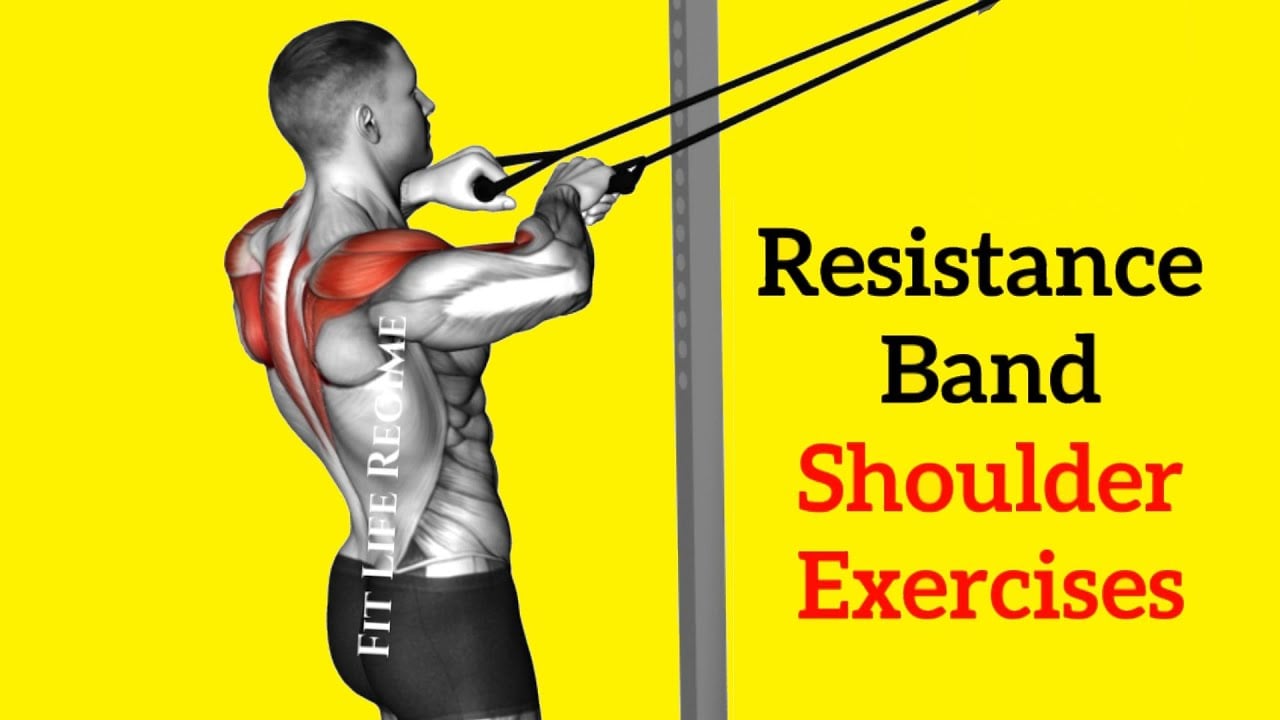Resistance bands are a great way to build and strengthen your shoulders without expensive equipment or a gym membership. They are portable and can be used anywhere—at home, in the gym, or while traveling.
Furthermore, resistance bands are safe for people with joint pain or injuries because they don’t hurt their joints. When I added resistance band exercises to my mother’s workout routine, her shoulder strength improved.
You can also easily add resistance band shoulder exercises to your current workout routine or create a new routine that will challenge you.
After reading this, you will understand how to plan your shoulder workout routines with a band that allows progressions to build strength over time.
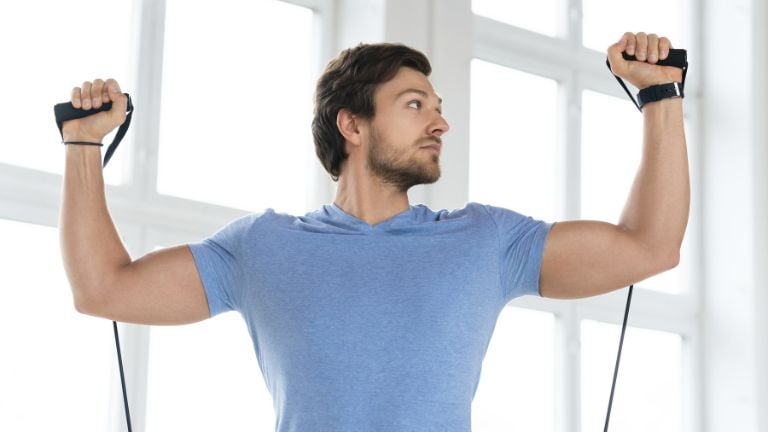
- Know About Shoulder Muscles
- 10 Best Resistance Band Exercises For Shoulder
- 1. Resistance Band Shoulder Press
- 2. Resistance Band Front Raise
- 3. Resistance Band Lateral Raises
- 4. Band Upright Row
- 5. Resistance Band Face Pulls
- 6. Resistance Band Pull Apart
- 7. Resistance Band Seated Row
- 8. Bent Over Resistance Band Rear Delt Fly
- 9. Resistance Band Shrugs
- 10. Standing Band Reverse Fly
- Complete Resistance Band Shoulder Workout Routines
- Resistance Band Beginner Shoulder Workout Plan
- Band Shoulder Workout Routine
- Benefits of Resistance Bands Shoulder Workout
- 1. Low-impact
- 2. Convenient and Cost-Effective
- 3. Build Muscle and Strength
- 4. Scalability and Variable Resistance
- 5. Improved Flexibility and Rehabilitation
- 6. Fun and Creative Workouts
- FAQs
- Are resistance bands good for shoulders?
- How often should I do resistance band shoulder exercises?
- Can I build muscle using just resistance bands?
- Can resistance bands help with shoulder pain?
- Conclusion
- References
Know About Shoulder Muscles
The shoulders comprise several muscles that work together to provide a wide range of motion and stability. The main muscles of the shoulder are the deltoids, rotator cuff, and trapezius.
In fitness, “shoulder exercises” refer to resistance exercises that target the deltoid muscle.
While the deltoid is technically a single muscle, anatomically speaking, it has three distinct sets of muscle fibers and muscle bellies, which are referred to as heads.
- The anterior deltoid (In front),
- lateral deltoid (at the side), and
- Posterior deltoid (behind),
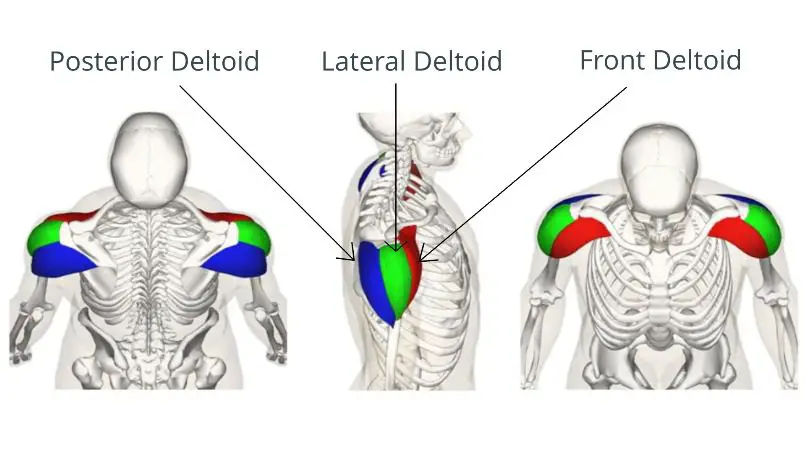
- The rotator cuff consists of four small muscles that attach to the shoulder blade and help stabilize the shoulder joint. The supraspinatus, infraspinatus, teres minor, and subscapularis muscles all make up the rotator cuff.
- The trapezius muscle is a large muscle that runs from the base of the skull to the middle of the back and is responsible for shoulder elevation, depression, and rotation.
10 Best Resistance Band Exercises For Shoulder
The top 10 resistance band shoulder exercises are perfect for home workouts or on-the-go training. With just an elastic band, you can sculpt strong, stable shoulders through a full range of motions.
1. Resistance Band Shoulder Press
The resistance band shoulder press is an exercise that targets the shoulders front and side deltoid muscles. It’s like a shoulder press with free weights but uses a band to create tension.
Resistance bands provide a smoother and more joint-friendly motion compared to heavier weights.
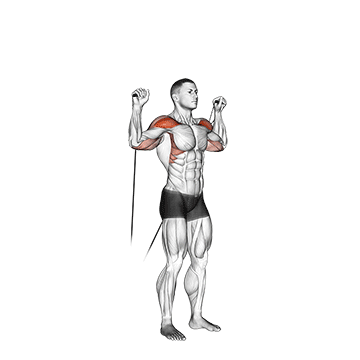
How To Do
- Use a resistance band that is challenging but not too difficult.
- Stand in the middle of the band and hold the handles with one hand over the other.
- Press the handles overhead while extending your arms fully.
- Pause briefly at the top of the movement.
- Slowly lower the band back to the starting position.
2. Resistance Band Front Raise
Band front raise exercise specifically targets the anterior deltoid muscles. Resistance bands are light and easy to carry, so they’re great for home workouts and when you’re traveling.
Over time, doing the front raise increases muscular hypertrophy, improves muscular endurance, and improves neuromuscular control connection.
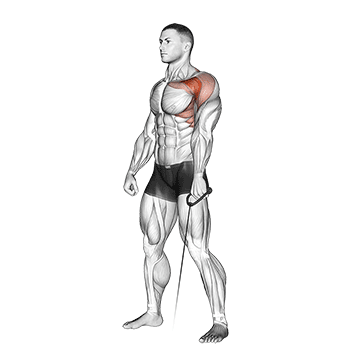
How To Do
- Stand with feet hip-width apart with knees slightly bent.
- Hold the band with a single arm (or one end of the band, in each hand) with palms facing inward.
- Raise your arms in front of you to shoulder height. Keep a slight bend in the elbows.
- Slowly lower back to the start position.
- Complete 10–12 reps, then switch sides.
Know More: Dumbbell Front Raise: How To Do, Muscle Worked And Benefits
3. Resistance Band Lateral Raises
The resistance band lateral raise is an exercise that works the lateral deltoids (sides of the shoulders).
There are many variations of the band lateral raise that will challenge your muscles even more and help build strength and definition of the shoulder.
- To make the exercise easier, use a lighter resistance band.
- Use a heavier resistance band or do more repetitions to make the exercise harder.
- A Single-arm band can create a better mind-muscle connection
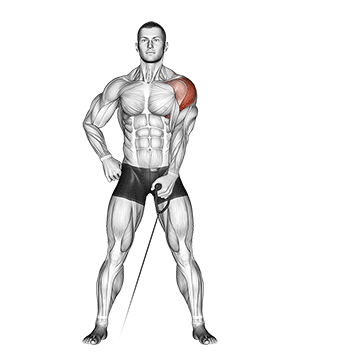
How To Do
- Stand with feet hip-width apart, knees slightly bent.
- Hold the band with a single arm (or one end of the band in each hand), palms facing down.
- Raise your arms to the sides until they parallel the floor. Avoid raising them high.
- Slowly return to the start position.
- Complete 8–12 reps, then switch sides.
- Exhale as you raise your arms and inhale as you lower them
Know More: Dumbbell Lateral Raise: How To Do, Muscle Worked And Tips
4. Band Upright Row
If you’re looking to increase shoulder and upper back strength, try the resistance band upright row.
The band upright row exercise targets the muscles of the shoulder and upper back, including the deltoids, trapezius, rhomboids, and even the biceps, making it a great addition to any full-body workout.
The exercise is named “upright row” because the weight is lifted up in a vertical, or upright, direction.
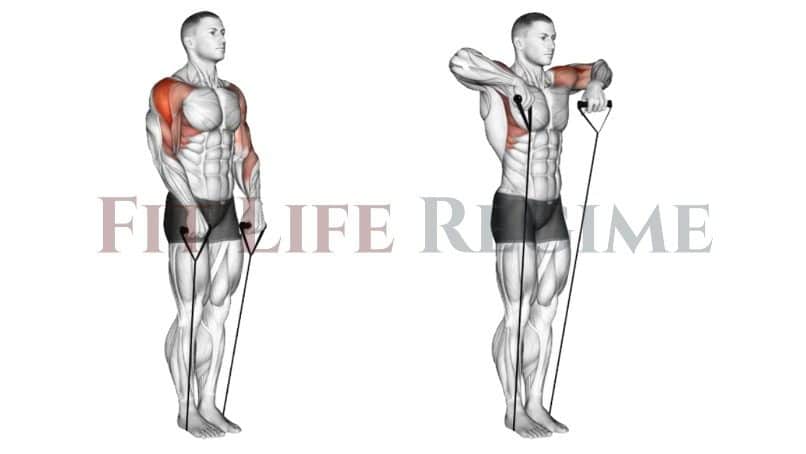
How To Do
- Stand with your feet shoulder-width apart. Start with a lighter band and work your way up.
- Hold a resistance band in each hand with an overhand grip. Let the band rest against your thighs.
- Pull hands straight up toward the chin.
- Pause at the top of the movement to feel your muscles contract.
- Slowly lower the band back to the starting position.
5. Resistance Band Face Pulls
Resistance Band Face Pulls are a fantastic shoulder exercise that primarily targets the rear deltoid and middle trap.
It will help improve your shoulder strength, range of motion, and posture. Give them a shot, and you might just find them a great addition to your workout routine.
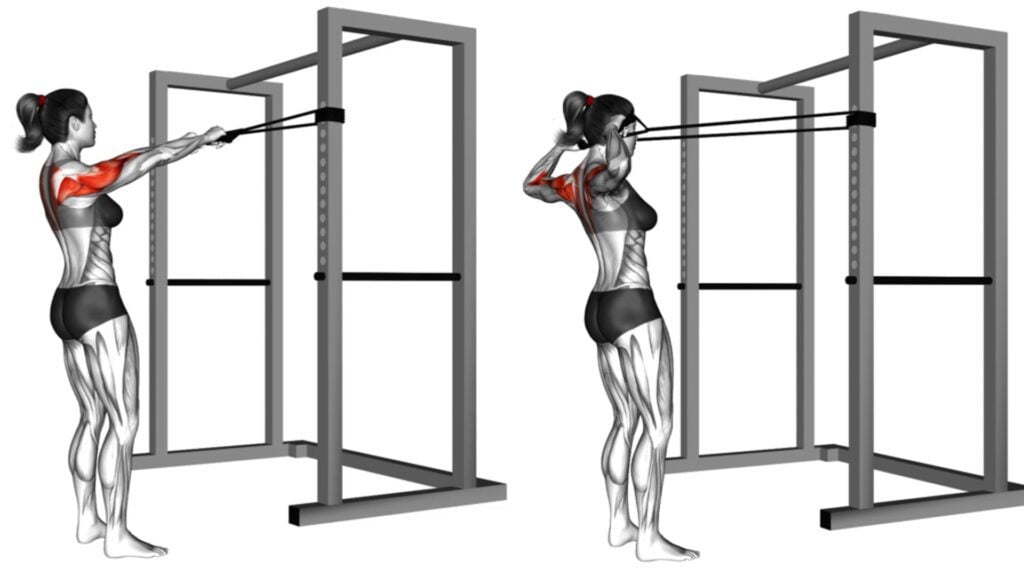
How To Do
- Anchor the band at shoulder height and stand holding the handles.
- Maintain an upright posture: don’t lean back. Avoid shrugging or raising your shoulders.
- Pull the handles toward your face with elbows flared out.
- Squeeze shoulder blades together as you pull.
- Slowly return to the start position.
- Complete 10–15 reps.
6. Resistance Band Pull Apart
It’s a great shoulder and upper back exercise that primarily targets the posterior deltoids, trapezius, and rhomboids.
Regular practice of resistance band pull-apart can counteract the negative effects of prolonged sitting and poor posture.
You can perform this movement on a shoulder day, but you can also perform it on a back day.
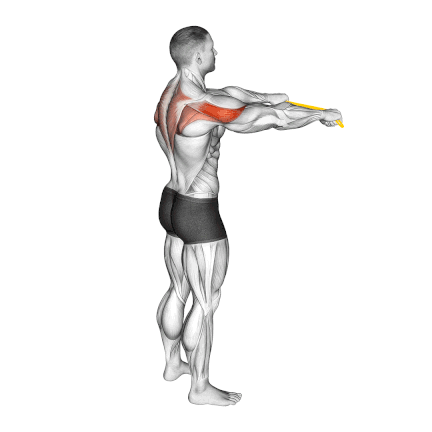
How To Do
- You should stand with your feet shoulder-width apart and keep a slight knee bend.
- Hold the exercise band in front of you with your hands slightly lower than your shoulders.
- Keep your elbows slightly soft to avoid hyperextending the joint.
- Keep your elbows up so you can target your upper back muscles correctly.
- Squeeze the shoulder blades together and open the arms out to either side, pulling the band apart and squeezing your rhomboids.
- Return to the start and repeat, keeping the tension on the band the entire time.
7. Resistance Band Seated Row
The resistance band seated row primarily targets the traps, latissimus dorsi, rhomboids, rear delts, and biceps. It will also work your erector spinae, as you need your lower back to stabilize your movement.
Resistance bands are easy to carry and use, so you can do seated rows almost anywhere.
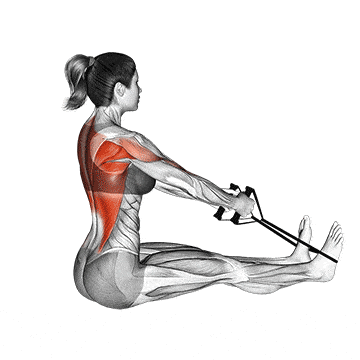
How To Do
- Sit on the floor with your legs extended. Loop the resistance band around the soles of your feet and hold one end in each hand.
- Keep your posture erect and your lower back slightly arched.
- Pull the handles to your lower abdomen. Keep your elbows close to your sides.
- Retract your shoulder blades as you pull the band back.
- As the handles touch your body, squeeze your shoulder blades together.
- Then, reverse direction, slowly returning to the start position.
8. Bent Over Resistance Band Rear Delt Fly
The rear delt band fly is an isolation exercise that increases deltoid muscle definition and strength. It primarily works the upper back muscles, specifically the rhomboids, rear deltoids, and traps.
The exercise helps to improve posture and increase upper back and shoulder strength.
A strong upper back will not only help you look better and shape your body but will also help you avoid back problems in the future.
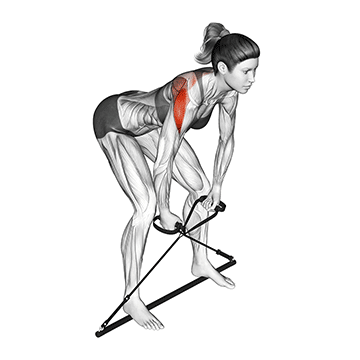
How To Do
- Stand with feet flat on the ground on top of the middle of the resistance band.
- With your knees slightly bent, lean over and bend your hips. Keep your head up, and back neutral.
- Take a handle in each arm and make an “X” shape.
- Keeping your back flat, pull out to each side with each arm simultaneously.
- Hold on to the top and hold for 1–2 seconds.
- Reverse the position and return to the starting position.
9. Resistance Band Shrugs
If you want to build a big trap and search for the resistance band shoulder exercise, you’ve come to the right place.
Resistance band shrugs, also known as band shoulder shrugs, are isolation exercises that target your trapezius muscles.
When you do band shrug exercises to strengthen and balance your traps muscles, you’ll be able to lift more weight.
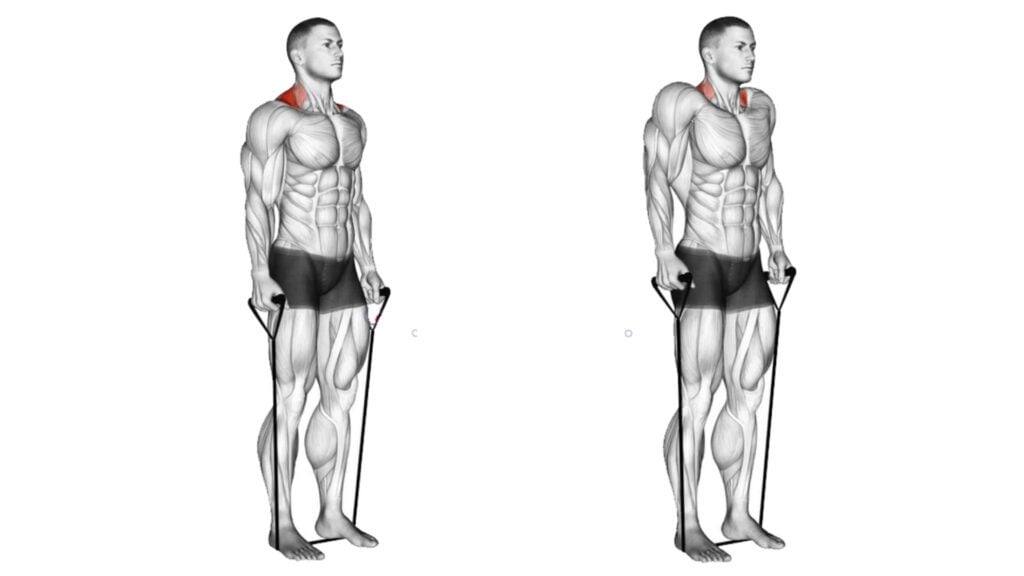
How To Do
- Stand in the middle of the band and grasp both ends by your side.
- Keep your elbows straight and lift your shoulders upward. Exhale while performing this movement. Hold the contraction at the top for a second.
- Prevent from rolling your shoulders, as this is an incorrect form and can result in injury.
- Slowly lower to its starting position.
- Avoid bending your elbows to complete the motion.
- Repeat for the desired number of reps.
Know More: Shrug Exercise: Benefits, Variations, Muscles Used, Tips
10. Standing Band Reverse Fly
This movement can be done on shoulder day, as it targets the rear delts and lower trap. However, we also like to hit it on a back day, as the rear delts often need to double the weekly work.
The reverse fly with bands will work your rhomboids, rear delts, and traps.
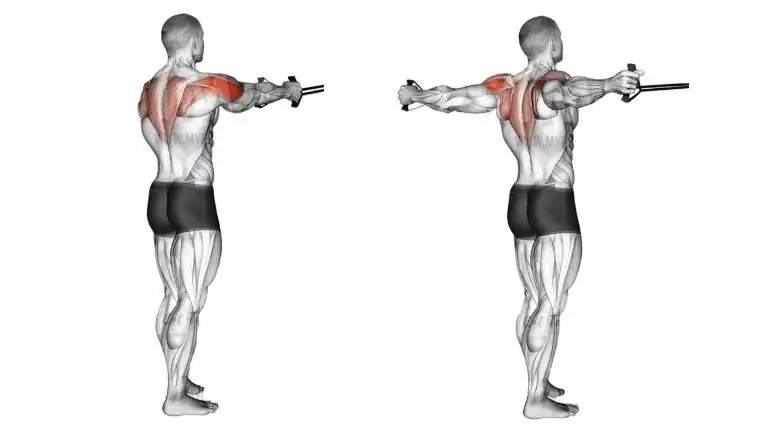
How To Do
- Stand with your feet shoulder-width apart.
- Place a band around a stationary post, such as a squat rack.
- Hold the exercise band in front of you with your hands slightly lower than your shoulders.
- Keep your elbows slightly soft to avoid hyperextending the joint.
- Pull the band apart and squeeze your shoulder blades together.
- Return to start and repeat, keeping tension on the band the entire time.
Complete Resistance Band Shoulder Workout Routines
As you saw above, many exercises engage both primary and secondary muscles. To build an all-around strong shoulder, you must hit all areas of the shoulder.
- For the front delt, you can do band shoulder press, band front raise, and band front raise.
- For lateral delt, do band lateral raise and band upright row.
- The rear delt can be worked with exercises like bent-over band lateral raise, face pull, and rear delt fly.
- The trap muscles can be done with band shrug and face pull.
Resistance Band Beginner Shoulder Workout Plan
| Exercise | Sets | Reps | Rest |
|---|---|---|---|
| Band Shoulder Press | 3-4 | 10-12 | 90s |
| Front Cable raise | 3-4 | 12-15 | 90s |
| Resistance Band Upright | 3 | 12-15 | 90s |
| One Arm Band Lateral Raise | 3 | 10-12 | 90s |
Band Shoulder Workout Routine
| Exercise | Sets | Reps | Rest |
|---|---|---|---|
| Band Overhead Press | 3-4 | 8-10 | 60s |
| Resistance Band Lateral Raises | 3-4 | 10-12 | 60s |
| Band Face Pulls | 3 | 10-12 | 60s |
| Band Upright Row | 3 | 10-12 | 60s |
Benefits of Resistance Bands Shoulder Workout
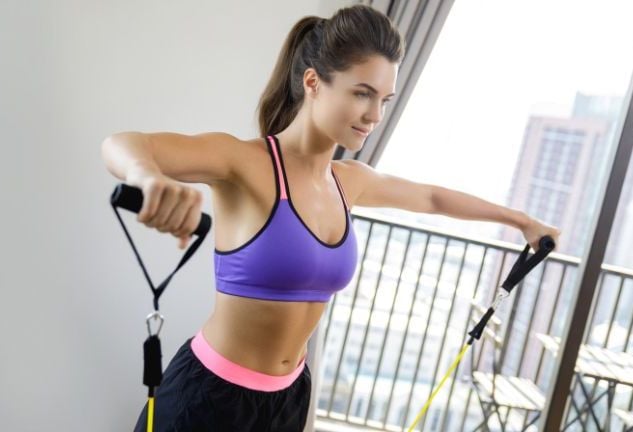
1. Low-impact
Resistance bands are a low-impact form of exercise, which means they put less stress on your joints than other forms of exercise, such as running or jumping. It is an excellent option for people with joint pain or injuries
2. Convenient and Cost-Effective
Resistance bands are cheaper than regular gym equipment, which makes fitness more accessible to more people.
Resistance bands are light and easy to carry, so they’re great for home workouts, travel, or even outdoor training. There is no need for heavy equipment or dedicated spaces—bands allow for efficient workouts anytime, anywhere.
3. Build Muscle and Strength
Resistance bands are easy to use, even for beginners. They can be used for many exercises to build muscle and strength.
This study found that resistance band training effectively increased muscle strength and size in older adults.
4. Scalability and Variable Resistance
Bands are available in various resistance levels, accommodating beginners to advanced athletes.
Bands become more tense as they are stretched, creating variable resistance throughout the range of motion and challenging muscles more effectively.
5. Improved Flexibility and Rehabilitation
Bands are commonly used in physical therapy for injury recovery, assisting in gentle strength building. Stretching with resistance bands helps to improve flexibility and range of motion.
Bands have a smooth resistance curve, which makes them good for rehabilitation and people with joint problems.
6. Fun and Creative Workouts
Resistance bands can target various muscle groups, making them versatile exercise tools.
Bands can be looped, anchored, or used differently, making workouts engaging and enjoyable. Bands can be combined with free weight or bodyweight exercises for added intensity and variety.
FAQs
Are resistance bands good for shoulders?
Yes, resistance bands are excellent for shoulders. They provide versatile and joint-friendly resistance. It also allows you to effectively target all parts of the shoulder complex – front, lateral, and rear deltoids. They help to improve flexibility and range of motion in the shoulders.
How often should I do resistance band shoulder exercises?
You should exercise 2-3 times a week and take a day off between sessions to let your muscles recover. Don’t work the same muscle group 2 days in a row.
Can I build muscle using just resistance bands?
Yes, you can build muscle using only resistance bands. Resistance bands are versatile tools that can target all major muscle groups. They provide progressive resistance to stimulate muscle growth. Focus on hypertrophy rep ranges and increase band tension over time.
Can resistance bands help with shoulder pain?
Yes, resistance bands can be beneficial for shoulder pain. Resistance band exercises can help rehabilitate and strengthen the shoulder muscles when used correctly and under professional guidance, potentially reducing discomfort.
Conclusion
Shoulder exercises with resistance bands are a great way to strengthen and tone your shoulders. They are also low-impact, making them a good option for people with joint pain or injuries.
If you’re new to resistance band exercises, it’s essential to start with a light resistance band and gradually increase the resistance as you get stronger.
Consult a doctor or physical therapist before starting any new exercise program, especially if you have any health concerns.
We hope this blog post has inspired you to try band shoulder exercises.
References
- 1Fukunaga T, Fedge C, Tyler T, Mullaney M, Schmitt B, Orishimo K, McHugh M, Nicholas S. Band Pull-Apart Exercise: Effects of Movement Direction and Hand Position on Shoulder Muscle Activity. Int J Sports Phys Ther. 2022 Apr 2;17(3):400-408. doi: 10.26603/001c.33026. PMID: 35391860; PMCID: PMC8975561.
- Campos YAC, Vianna JM, Guimarães MP, Oliveira JLD, Hernández-Mosqueira C, da Silva SF, Marchetti PH. Different Shoulder Exercises Affect the Activation of Deltoid Portions in Resistance-Trained Individuals. J Hum Kinet. 2020 Oct 31;75:5-14. doi: 10.2478/hukin-2020-0033. PMID: 33312291; PMCID: PMC7706677.
- Coratella G, Tornatore G, Longo S, Esposito F, Cè E. An Electromyographic Analysis of Lateral Raise Variations and Frontal Raise in Competitive Bodybuilders. Int J Environ Res Public Health. 2020 Aug 19;17(17):6015. doi: 10.3390/ijerph17176015. PMID: 32824894; PMCID: PMC7503819.

Manish is a NASM-certified fitness and nutrition coach with over 10 years of experience in weight lifting and fat loss fitness coaching. He specializes in gym-based training and has a lot of knowledge about exercise, lifting technique, biomechanics, and more.
Through “Fit Life Regime,” he generously shares the insights he’s gained over a decade in the field. His goal is to equip others with the knowledge to start their own fitness journey.

